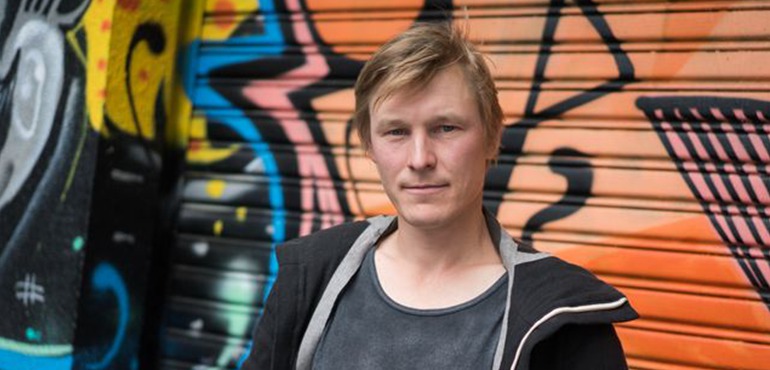
Technology – a double-edged sword
Jyri Engeström, a serial entrepreneur, is questioning whether technology improves the world. At the moment he’s interested in the potential reach of the internet and technology; they go both further and closer, into space and under the skin.
“Technology is moving closer to us; it’ll be used in various self-monitoring devices that have applications on and under our skin. Sensors connected to the internet can monitor blood, sleep, stress levels and even the digestive system,” says Jyri Engeström. He is known as the co-founder of the Jaiku service, which he began with Petteri Koponen. Jaiku was sold to Google in 2007, and after that Engeström worked with Google Buzz for a couple of years.
Engeström lives in San Francisco, and he tells us about a product he came across that eliminates the need to have a shower. It has only been in the last few decades that people have been in the habit of having a shower every day. Showering is not for everyone, though, as it destroys the beneficial bacterial strains on the skin. The product eliminates unpleasant odours without the need of a shower as it can be taken orally or spread onto the skin.
Devices presenting the other type of applications include drones and underwater robots that can go to places that used to be inaccessible, such as the Mayan pyramids in the Yucatan Peninsula and underwater caves, where the Engeström family discovered some skeletons with an OpenRov robot.
“Pretty soon, anyone will be able to explore space or take up archaeology. Research in seas and oceans, air and space will be revolutionised when laypeople make discoveries using affordable sensors, radio-controlled drones and underwater robots. This will change archaeology as much as blogs have changed journalism,” believes Engeström.
The underwater robot OpenRov was created when a group of self-taught ocean explorers wanted to design a device to study underwater caves. The idea turned into the Kickstarter project and an open research project.
The flip side
Even though Engeström is impressed by the drones and robots, he wants to question the role that technology plays in society. Now Engeström’s take on Jaiku and other social media is more critical.
“The success of social media has revealed a flip side; for example, we were unable to predict that some people would become addicted to social media and games. All we saw were the opportunities that technology and social media offered.”
Engeström thinks that technology already rules our lives too much. He thinks it’s sad that pupils in Finnish schools no longer learn cursive handwriting as they will not develop their own personal handwriting style if they just learn print-writing.
“It’s important now that our children learn to code before they learn to read. I don’t think this will make us more humane, on the contrary.”
Silicon Valley appreciates speed and novelties as well as disruption i.e. new technologies and innovations that radically redefine entire industries. According to Engeström, people in California are not always willing to protect old features even though we have a need to explore slower layers, traditions and permanent elements.
Engeström recognises dangers in Finland adopting too many ideas from Silicon Valley. “Any start-up environment should not be left solely to a small circle of entrepreneurs, as this would make any others feel like useless outsiders.”
Engeström hopes that events such as the largest start-up event in Europe, the Slush conference, would become a city festival open to everyone instead of being held in an impersonal and closed exposition centre.
“Nokia’s collapse can be explained by the fact that the on demand approach – common in Silicon Valley – doesn’t work in Finland, which is a welfare state that relies on strong institutions.”
A summer café in Helsinki
So, what should Finns do? Engeström’s answer to the question was to open his summer café Siili in Käpylä, Helsinki.
“Moaning doesn’t help; we need to roll our sleeves to make things happen. We Finns should go back to our roots. My roots are in the Käpylä community, that’s why I opened the café. We often think that we should change when in fact we should really be ourselves. That’s all we have.”
Engeström says that innovations emerge when the slow and the fast come together; when cultures and layers of society that work at a different pace collide. Fashion and trends, for example, change constantly while geological changes are extremely slow. The most intriguing finds in the research into Jupiter are those where the planet’s systems, spinning at different speeds, meet.
Jyri Engeström
Age: 37
Profession: Entrepreneur
What do you do in Silicon Valley? I’m the CEO of Alamo Square Labs, founder of Set and entrepreneur-in-residence at True Ventures in Silicon Valley. I also run the Sesat microschool and serve on the board of the cancer research foundation I established. Since June, I have also run a coffee shop at our Café Siili in Käpylä, Helsinki.
What do you expect to achieve in Silicon Valley? I came here in 2007 when Google acquired Jaiku, which I had founded.
The most unforgettable experience in Silicon Valley? A couple of years ago, a paediatrician pitched a start-up idea that was an iPhone app for treating spots. The doctor claimed that the wavelength of red light cures acne if you hold the phone close to the skin.